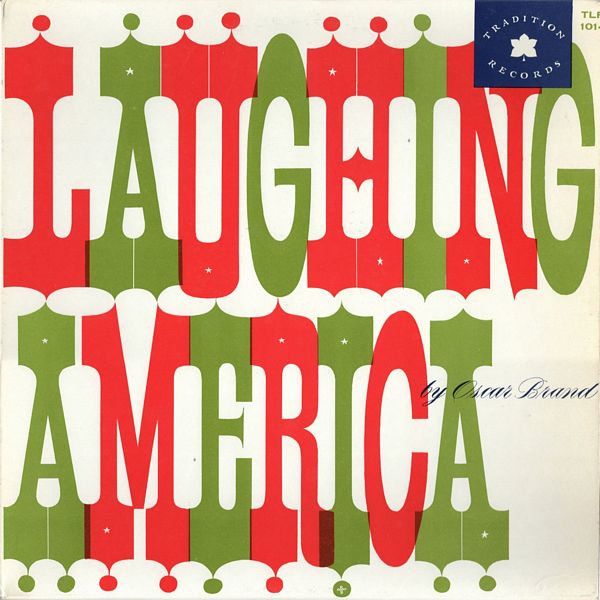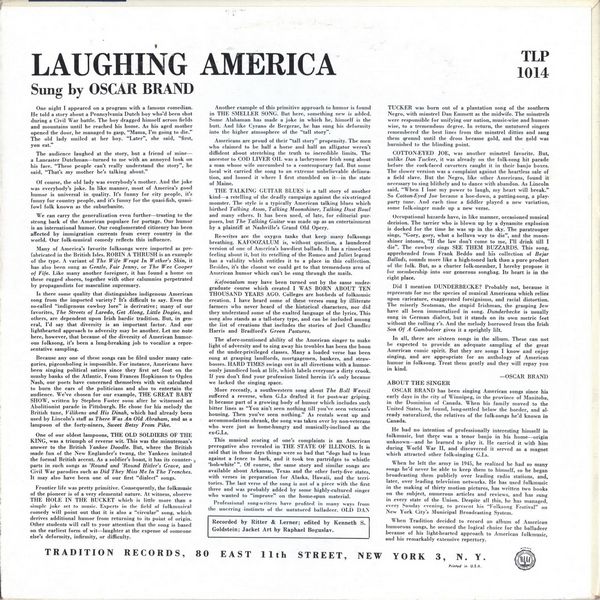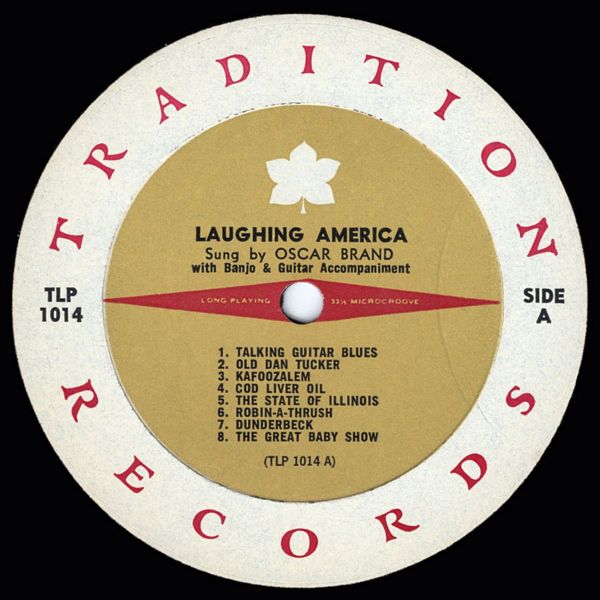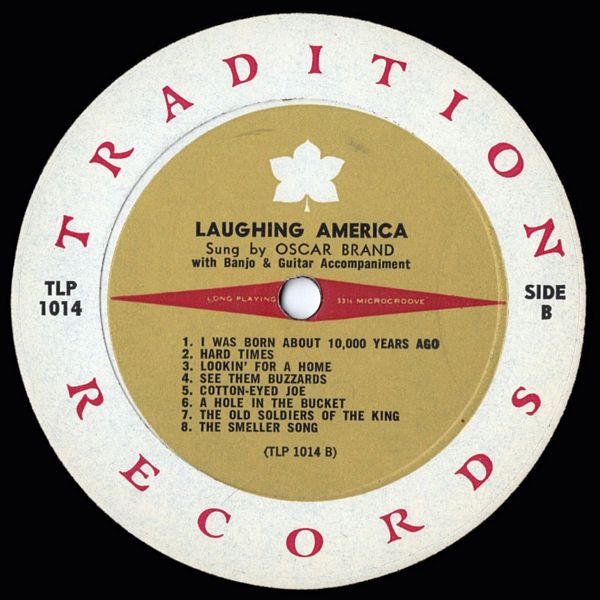

 |



|
Sleeve Notes
One night I appeared on a program with a famous comedian. He told a story about a Pennsylvania Dutch boy who'd been shot during a Civil War battle. The boy dragged himself across fields and mountains until he reached 'his home. As his aged mother opened the door, he managed to gasp, "Mama, I'm going to die." The old lady smiled at her boy. "Later", she said, "first, you eat."
The audience laughed at the story, but a friend of mine — a Lancaster Dutchman — turned to me with an annoyed look on his face. "These people can't really understand the story", he said, "That's my mother he's talking about."
Of course, the old lady was everybody's mother. And the joke was everybody's joke. In like manner, most of America's good humor is universal in quality. It's funny for city people, it's funny for country people, and it's funny for the quasi-fish, quasi-owl folk known as the suburbanite.
We can carry the generalization even further — trusting to the strong back of the American populace for portage. Our humor is an international humor. Our conglomerated citizenry has been affected by immigration currents from every country in the world. Our folk-musical comedy reflects this influence.
Many of America's favorite folksongs were imported as prefabricated in the British Isles. ROBIN A THRUSH is an example of the type. A variant of The Wife Wrapt In Wether's Skin, it has also been sung as Gentle, Fair Jenny, or The Wee Cooper of Fife. Like many another foreigner, it has found a home on these rugged shores, together with other calumnies perpetrated by propagandists for masculine supremacy.
Is there some quality that distinguishes indigenous American song from the imported variety? It's difficult to say. Even the so-called "indigenous cowboy lore" is derivative; many of our favorites, The Streets of Laredo, Get Along, Little Dogies, and others, are dependent upon Irish bardic tradition. But, in general, I'd say that diversity is an important factor. And our lighthearted approach to adversity may be another. Let me note here, however, that because of the diversity of American humorous folksong, it's been a lung-breaking job to vocalize a representative sampling.
Because any one of these songs can be filed under many categories, pigeonholing is impossible. For instance, Americans have been singing political satires since they first set foot on the mushy banks of the Atlantic. From Frances Hopkinson to Ogden Nash, our poets have concerned themselves with wit calculated to burn the ears of the politicians and also to entertain the audience. We've chosen for our example, THE GREAT BABY SHOW, written by Stephen Foster soon after he witnessed an Abolitionist parade in Pittsburgh. He chose for his melody the British tune, Vilikens and His Dinah, which had already been used by Lincoln's staff as There Was An Old Abraham, and as a lampoon of the forty-niners, Sweet Betsy From Pike.
One of our oldest lampoons, THE OLD SOLDIERS OF THE KING, was a triumph of reverse wit. This was the minuteman's answer to the British Yankee Doodle. But, where the British made fun of the New Englander's twang, the Yankees imitated the formal British accent. As a soldier's boast, it has its counterparts in such songs as 'Round and 'Round Hitler's Grave, and Civil War parodies such as Did They Miss Me In The Trenches. It may also have been one of our first "dialect" songs.
Frontier life was pretty primitive. Consequently, the folkmusic of the pioneer is of a very elemental nature. At Witness, observe THE HOLE IN THE BUCKET which is little more than a simple joke set to music. Experts in the field of folkmusical comedy will point out that it is also a "circular" song, which derives additional humor from returning to its point of origin. Other students will call to your attention that the song is based on the earliest form of wit — laughter at the expense of someone else's deformity, infirmity, or difficulty.
Another example of this primitive approach to humor is found in THE SMELLER SONG. But here, something new is added. Some Alabaman has made a joke in which he, himself is the butt. And like Cyrano de Bergerac, he has sung his deformity into the higher atmosphere of the "tall story".
Americans are proud of their "tall story" propensity. The men who claimed to be half a horse and half an alligator weren't diffident about stretching the truth to incredible limits. The ancestor to COD LIVER OIL was a lachrymose Irish song about a man whose wife succumbed to a contemporary fad. But some local wit carried the song to an extreme unbelievable delineation, and loosed it where I first stumbled on it — in the state of Maine.
THE TALKING GUITAR BLUES is a tall story of another kind — a retelling of the deadly campaign against the six-stringed monster. The style is a typically American talking blues which birthed Talking Atom, Talking Moonshiner, Talking Dust Bowl and many others. It has been used, of late, for editorial purposes, but The Talking Guitar was made up as an entertainment by a plaintiff at Nashville's Grand Old Opery.
Re-writes are the oxygen tanks that keep many folksongs breathing. KAFOOZALUM is, without question, a laundered version of one of America's bawdiest ballads. It has a rinsed-out feeling about it, but its retelling of the Romeo and Juliet legend has a validity which entitles it to a place in this collection. Besides, it's the closest we could get to that tremendous area of American humor which can't be sung through the mails.
Kafoozalum may have been turned out by the same tinder — graduate course which created I WAS BORN ABOUT TEN THOUSAND YEARS AGO. Colleges are hot-beds of folkmusic creation. I have heard some of these verses sung by illiterate farmers who never heard of the historical characters, nor did they understand some of the exalted language of the lyrics. This song also stands as a tall-story type, and can be included among the list of creations that includes the stories of Joel Chandler Harris and Bradford's Green Pastures.
The afore-mentioned ability of the American singer to make light of adversity and to sing away his troubles has been the boon of the under-privileged classes. Many a loaded verse has been sung at grasping landlords, mortgagemen, bankers, and straw-bosses. HARD TIMES swings out in all directions with a humorously jaundiced look at life, which labels everyone a dirty crook. If you don't find your profession listed herein it's only because we lacked the singing space.
More recently, a southwestern song about The Boll Weevil suffered a reverse, when G.I.s drafted it for post-war griping. It became part of a growing body of humor which includes such bitter lines as "You ain't seen nothing till you've seen veteran's housing. Then you've seen nothing." As rentals went up and accommodations shrank, the song was taken over by non-veterans who were just as home-hungry and musically-inclined as the ex-G.I.s.
This musical scoring of one's complaints is an American prerogative also revealed in THE STATE OF ILLINOIS. It is said that in those days things were so bad that "dogs had to lean against a fence to bark, and it took ten partridges to whistle 'bob-white' ". Of course, the same story and similar songs are available about Arkansas, Texas and the other forty-five states, with verses in preparation for Alaska, Hawaii, and the territories. The last verse of the song is not of w piece with the first three and was probably added by some highly-cultured singer who wanted to "improve" on the home-spun material.
Professional song-writers have profited in many ways from the unerring instincts of the untutored balladeer. OLD DAN TUCKER was born out of a plantation song of the southern Negro, with minstrel Dan Emmett as the midwife. The minstrels were responsible for unifying our nation, music-wise and humor-wise, to a tremendous degree. In return, the untutored singers remembered the best lines from the minstrel ditties and sang them around until the dross became gold, and the gold was burnished to the blinding point.
COTTON-EYED JOE, was another minstrel favorite. But, unlike Dan Tucker, it was already on the folk-song hit parade before the cork-faced cavorters caught it in their banjo boxes. The slower version was a complaint against the heartless sale of a field slave. But the Negro, like other Americans, found it necessary to sing blithely and to dance with abandon. As Lincoln said, "When I lose my power to laugh, my heart will break." So Cotton-Eyed Joe became a hoe-down, a patting-song, a play-party tune. And each time a fiddler played a new variation, some folk-singer made up a new verse.
Occupational hazards have, in like manner, occasioned musical derision. The tarrier who is blown up by a dynamite explosion is docked for the time he was up in the sky. The paratrooper sings, "Gory, gory, what a helluva way to die", and the moonshiner intones, "If the law don't come to me, I'll drink till I die". The cowboy sings SEE THEM BUZZARDS. This song, apprehended from Frank Beddo and his collection of Bejar Ballads, sounds more like a high-toned lark than a pure product of the folk. But, as a charter folk-member, I hereby propose it for membership into our generous songbag. Its heart is in the right place.
Did I mention DUNDERBECKE? Probably not, because it represents for me the species of musical Americana which relies upon caricature, exaggerated foreignisms, and racial distortion. The miserly Scotsman, the stupid Irishman, the grasping Jew have all been immortalized in song. Dunderbecke is usually sung in German dialect, but it stands on its own metric feet without the rolling r's. And the melody borrowed from the Irish Son Of A Gamboleer gives it a sprightly lilt.
In all, there are sixteen songs in the album These can not be expected to provide an adequate sampling of the great American comic spirit. But they are songs I know and enjoy singing, and are appropriate for an anthology of American humor in folksong. Treat them gently and they will repay you in kind.
— OSCAR BRAND
ABOUT THE SINGER —
OSCAR BRAND has been singing American songs since his early days in the city of Winnipeg, in the province of Manitoba, in the Dominion of Canada. When his family moved to the United States, he found, long-settled below the border, and already naturalized, the relatives of the folk-songs he'd known in Canada.
He had no intention of professionally interesting himself in folkmusic, but there was a tenor banjo in his home — origin unknown — and he learned to play it. He carried it with him during World War II, and discovered it served as a magnet which attracted other folk-singing G.I.s.
When he left the army in 1945, he realized he had so many songs he'd never be able to keep them to himself, so he began broadcasting them publicly over leading radio stations, and, later, over leading television networks. He has used folkmusic in the making of thirty motion pictures, has written two books on the subject, numerous articles and reviews, and has sung in every state of the Union. Despite all this, he has managed, every Sunday evening, to present his "Folksong Festival" on New York City's Municipal Broadcasting System.
When Tradition decided to record an album of American humorous songs, he seemed the logical choice for the balladeer because of his light-hearted approach to American folkmusic, and his remarkably extensive repertory.